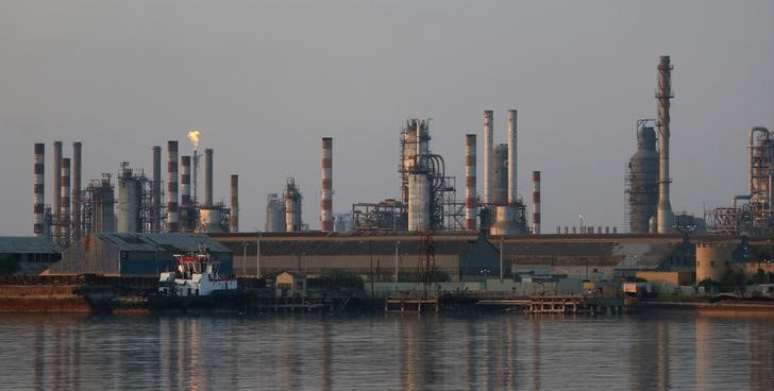Gulf countries are pressuring Washington to stop Israel from attacking Iranian oil facilities because they fear their own oil facilities could be attacked by Tehran’s allies if the conflict escalates, three Gulf sources told Reuters.
As part of their attempts to avoid being caught in the crossfire, Gulf countries, including Saudi Arabia, the United Arab Emirates and Qatar, refuse to allow Israel to fly over their airspace for any attack to Iran and forwarded it to Washington, said three sources close to government circles.
Israel has vowed that Iran will pay for its missile attack last week, while Tehran has said any retaliation would be met with great destruction, raising fears of a wider war in the region that could hit the United States.
The Gulf countries’ actions follow a diplomatic effort by non-Arab Shiite Iran to persuade its Sunni Gulf neighbors to use their influence on Washington, amid growing concerns that Israel could attack Iranian oil production facilities.
During meetings this week, Iran warned Saudi Arabia that it could not guarantee the security of the Gulf kingdom’s oil facilities if Israel received assistance in carrying out an attack, a senior Iranian official told Reuters and an Iranian diplomat.
Ali Shihabi, a Saudi analyst close to the Saudi royal court, said: “The Iranians said, ‘If the Gulf countries opened their airspace to Israel, it would be an act of war.’ But (Saudi Arabia) did not will allow no one to use your airspace.”
The diplomat said Tehran had sent a clear message to Riyadh that its allies in countries such as Iraq or Yemen could retaliate if there was regional support for Israel against Iran.
A possible Israeli attack was at the center of talks on Wednesday between Saudi Crown Prince Mohammed bin Salman and Iranian Foreign Minister Abbas Araqchi, who was touring the Gulf to drum up support, according to Gulf and Iranian sources.
The Iranian minister’s visit, along with Saudi-American communications at the Defense Ministry level, are part of a coordinated effort to address the crisis, a Gulf source close to government circles told Reuters.
A person in Washington familiar with the discussions confirmed that Gulf officials had contacted their US counterparts to express concerns about the possible extent of the expected retaliation by Israel.
The White House declined to comment when asked whether Gulf governments had asked Washington to ensure Israel’s response was measured. US President Joe Biden and Israeli Prime Minister Benjamin Netanyahu spoke out Wednesday about Israeli retaliation in a call that both sides described as positive.
Jonathan Panikoff, a former US deputy national intelligence officer for the Middle East and currently a member of the Atlantic Council think tank in Washington, said: “The Gulf states’ anxiety will likely be a key point of discussion with Israeli colleagues, in an attempt to convince Israel. to give a carefully calibrated response.”
OIL AT RISK?
The Organization of the Petroleum Exporting Countries (OPEC), which is effectively led by Saudi Arabia, has enough oil reserve capacity to offset any loss of Iranian supplies if Israeli retaliation were to knock out some of the country’s facilities.
However, much of this unused capacity is located in the Gulf region, so if oil facilities in Saudi Arabia or the United Arab Emirates, for example, were also affected, the world could face an oil supply problem.
Saudi Arabia has been wary of an Iranian attack on its oil facilities since a 2019 attack on the Aramco oil field disrupted more than 5% of global oil supplies. Iran has denied involvement.
Riyadh has enjoyed a rapprochement with Tehran in recent years, but trust remains an issue. Bahrain, Kuwait, Qatar, Saudi Arabia and the United Arab Emirates host US military installations or troops.
Concerns about oil facilities and the possibility of a broader regional conflict were also central to talks between Emirati officials and their US counterparts, another Gulf source said.
In 2022, Iran-aligned Houthis in Yemen fired missiles and drones at oil supply trucks near an oil refinery owned by the United Arab Emirates’ state oil company Adnoc and claimed responsibility for the attack.
“The Gulf countries do not allow Israel to use their airspace. They will not allow Israeli missiles to pass through, and there is also hope that they will not hit the oil facilities,” the Gulf source said.
The three Gulf sources stressed that Israel could direct attacks through Jordan or Iraq, but using Saudi Arabia, the United Arab Emirates or Qatar’s airspace was out of the question and strategically unnecessary.
Analysts also pointed out that Israel has other options, including in-flight refueling capabilities that would allow its planes to fly across the Red Sea to the Indian Ocean, head to the Gulf and then fly back.
Israel will calibrate its response and, as of Wednesday, had not yet decided whether to attack Iranian oil fields, according to two senior Israeli officials.
According to officials, the option was one of many presented by the defense establishment to Israeli leaders.
Source: Terra
Rose James is a Gossipify movie and series reviewer known for her in-depth analysis and unique perspective on the latest releases. With a background in film studies, she provides engaging and informative reviews, and keeps readers up to date with industry trends and emerging talents.






